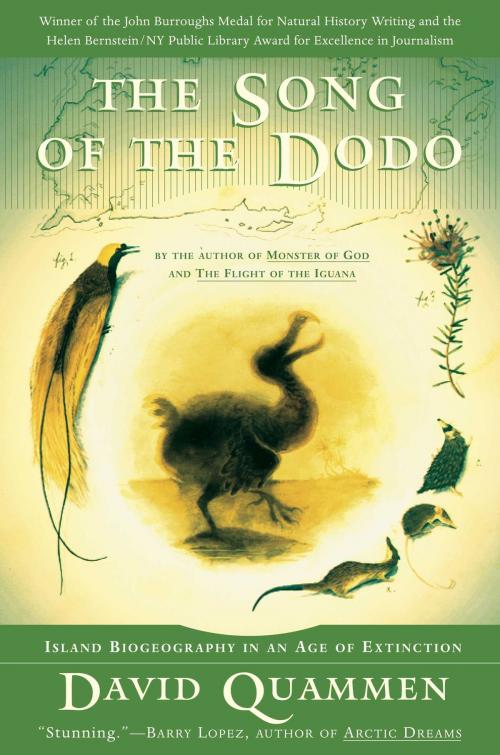The Song of the Dodo
Island Biogeography in an Age of Extinctions
Nonfiction, Science & Nature, Nature, Environment, Environmental Conservation & Protection| Author: | David Quammen | ISBN: | 9781439124963 |
| Publisher: | Scribner | Publication: | March 15, 2011 |
| Imprint: | Scribner | Language: | English |
| Author: | David Quammen |
| ISBN: | 9781439124963 |
| Publisher: | Scribner |
| Publication: | March 15, 2011 |
| Imprint: | Scribner |
| Language: | English |
David Quammen's book, The Song of the Dodo, is a
brilliant, stirring work, breathtaking in its scope,
far-reaching in its message -- a crucial book in
precarious times, which radically alters the way in
which we understand the natural world and our place
in that world. It's also a book full of entertainment
and wonders.
In The Song of the Dodo, we follow Quammen's keen
intellect through the ideas, theories, and experiments
of prominent naturalists of the last two centuries.
We trail after him as he travels the world,
tracking the subject of island biogeography, which
encompasses nothing less than the study of the origin
and extinction of all species. Why is this island
idea so important? Because islands are where
species most commonly go extinct -- and because, as
Quammen points out, we live in an age when all of
Earth's landscapes are being chopped into island-like
fragments by human activity.
Through his eyes, we glimpse the nature of evolution
and extinction, and in so doing come to understand
the monumental diversity of our planet, and
the importance of preserving its wild landscapes,
animals, and plants. We also meet some fascinating
human characters. By the book's end we are wiser,
and more deeply concerned, but Quammen
leaves us with a message of excitement and hope.
David Quammen's book, The Song of the Dodo, is a
brilliant, stirring work, breathtaking in its scope,
far-reaching in its message -- a crucial book in
precarious times, which radically alters the way in
which we understand the natural world and our place
in that world. It's also a book full of entertainment
and wonders.
In The Song of the Dodo, we follow Quammen's keen
intellect through the ideas, theories, and experiments
of prominent naturalists of the last two centuries.
We trail after him as he travels the world,
tracking the subject of island biogeography, which
encompasses nothing less than the study of the origin
and extinction of all species. Why is this island
idea so important? Because islands are where
species most commonly go extinct -- and because, as
Quammen points out, we live in an age when all of
Earth's landscapes are being chopped into island-like
fragments by human activity.
Through his eyes, we glimpse the nature of evolution
and extinction, and in so doing come to understand
the monumental diversity of our planet, and
the importance of preserving its wild landscapes,
animals, and plants. We also meet some fascinating
human characters. By the book's end we are wiser,
and more deeply concerned, but Quammen
leaves us with a message of excitement and hope.















